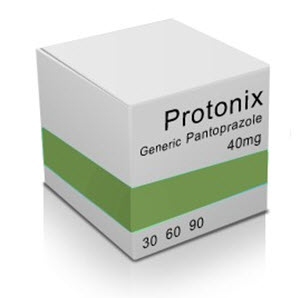 Type: PPI
Type: PPI
Active ingredient: Pantoprazole
Common use: Protonix is a proton pump inhibitor (PPI) chiefly used to treat gastroesophageal reflux, erosive esophagitis, ulcers or Zollinger-Ellison syndrome. For certain types of ulcers, Protonix treatment is normally combined with antibiotics treatment.
Protonix work by blocking acid production in the stomach.
How to use: Unless otherwise ordered by your doctor, swallow the Protonix tablet or capsule whole with a glass of water. Only take together with antacids if instructed to do so by your doctor.
If you miss a dose of Protonix, take it as soon as possible. If it is almost time to take your next dose, skip the missed dose permanently and stick to your regular dosing schedule. Do no take two doses at once or near each other in time.
How to store: Store Protonix at room temperature in a tightly-closed container, and keep away from heat, light and moisture.
Warnings:
- Keep all doctor appointments and laboratory appointments while being treated with Protonix.
- Protonix can influence the result of certain laboratory tests. It can for instance give a false positive for THC if your urine is tested. Always inform lab staff that you are being treated with Protonix.
- While being treated with Protonix, to not take any other prescription medicine, over-the-counter medicine or alternative treatment without first consulting with your doctor or pharmacist.
- Seek immediate medical attention if you experience sings of an allergic reaction to Protonix, such as rash, hoarseness, difficulties swallowing, difficulties breathing, swollen throat, swollen tongue, swollen lips, swollen face, swollen eyes or swollen hands.
- Discuss the benefits and risks of using Protonix during pregnancy with your doctor.
- It is unknown if Protonix is excreted in breast milk.
Examples of reported side-effects of Protonix:
- Dizziness
- Headache
- Nausea
- Diarrhea
